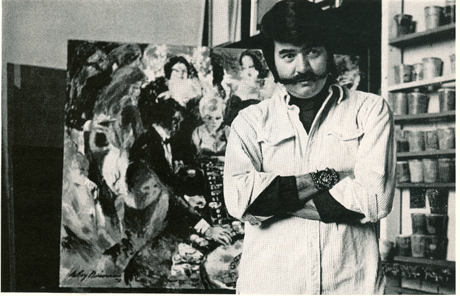From our man Pete, republished with her permission, this story originally appeared in Playboy back in 1988.
By Pete Dexter
Back in the early Sixties, when Floyd Patterson was still heavyweight champion of the world, an intelligent and high-spirited boxing writer named Jack McKinney was passing an afternoon in Darien, Connecticut, with Cus D’Amato, talking, among other things, about Patterson’s upcoming fight with Sonny Liston. D’Amato, of course, was Patterson’s manager. P
In its way, it was a melancholy conversation. The question was not if Liston would win but if Patterson—a limited fighter—would be maimed. D’Amato cared more for the fighter than the title.P
“Cus had vision,” McKinney said, “but he didn’t need it to see what was about to happen to Patterson.”P
And then, after they talked about Patterson and Liston, and the way things were and the way they ought to be, D’Amato leaned back in his chair and looked at the ceiling and began to talk about a different kind of fighter. P
He told McKinney that if he could find the right athlete—someone with intelligence, concentration, hand speed, coordination and courage, who had never boxed a minute—he could turn that athlete into a world champion.P
The guess is that my friend McKinney—who had once disappeared from his job at thePhiladelphia Daily News for most of a week, only to surface in Sandusky, Ohio, knocking out a professional middleweight fighter in a four-round preliminary—began to think this might be his own shot at the title. But no.P
“He wanted someone fresh, who hadn’t been around boxing,” McKinney said. “Usually, by the time you were good enough to be noticed by Cus, you had acquired habits that couldn’t be changed. Things had been set in motion.”P
D’Amato eventually got such an athlete into the ring, but nothing came of it. At least, not right away.P
Six or seven years after that conversation in Connecticut, a child was born in an unhealthy part of Brooklyn called Bedford-Stuyvesant to a woman named Lorna Tyson. He was the youngest of her three children and the most like her—timid, soft-spoken, shy. He played mostly with his sister. On the streets of Bedford-Stuyvesant, he was sometimes called “little fairy boy,” and no place outside his apartment was safe for him. When the boy was ten, his mother moved from Bedford-Stuyvesant to Brownsville, which is also in Brooklyn. The neighborhoods are different in that in Brownsville, the weak and the timid are not teased, they are eaten. The boy was beaten up again and again; his shoes were stolen; the little money he had belonged to whoever saw him first. P
He kept pigeons on the roof and called them his “babies.” I am thinking now of his square, dimpled hands stroking and feeding his babies; I am thinking of the revelation that must have come when he finally used them as weapons. The story, of course, has been told. Ten-year-old Michael Tyson, who would turn over his shoes or his coat or his money, drew the line at his pigeons. P
An older boy tried to take one of them away, and Michael began to swing. The revelation was not so much that he won the fight but how much he enjoyed it.P
“I was beating the shit out of this guy,” he said, “and I was so happy. To this day, it makes me happy. The fight itself, when all the talk is over and there is nothing left to say, nothing else to do but fight. That’s the best part, in the ring. The rest of it, being the champion, I don’t get so much pleasure from that as you might think.”P
So young Michael kicked the shit out of the kid who had tried to steal his pigeon; then he kicked the shit out of some of the kids who had stolen his clothes and money; and then he kicked the shit out of a bunch of people who just seemed to need the shit kicked out of them.P
Noticing this, members of the Brownsville community began to include him in their activities. “They held the guns,” he told Sports Illustrated in 1986.”I just put everything in a bag. I was 11.” P
The stealing bothered Michael’s mother, and it bothered the cashiers in the stores that were being held up, and eventually it bothered the police. And so, just when he’d finally adjusted to Brooklyn, Michael found himself moving to the Tyron School for Boys in Upstate New York, which is sort of a prep school for youngsters trying to get into Attica.P
And it was there, at the age of 13, that he met Bobby Stewart, who taught him the fundamentals of boxing. Five years before, Stewart had been the 178-pound national Golden Gloves champion, which is to say he could fight. Within a few months, however, Tyson was giving him all he could handle.P
Stewart took the boy to his friend Cus D’Amato, who watched him spar three rounds, talked with him a few minutes and saw the fighter he had been waiting for all his life.P
D’Amato had become reclusive in the last years, at least as distrustful of the Don Kings and Bob Arums as he had been of guys like Frankie Carbo and Blinky Palermo back when they owned and operated the sport. He lived in a large farmhouse outside Catskill, New York, overlooking the Hudson River, and trained his fighters in the gym on the third floor of Citizens Hose Company, in town.P
He educated the boy in his house and in his gym; and if you were looking for the difference between Mike Tyson and the other fighters D’Amato had taught, it probably lay in the depth of Tyson’s understanding of the things D’Amato was teaching him.P
It is one thing to know what words mean and accept them, it is another thing to believe them. You may understand intellectually that courage is not a constant in anyone and that discipline is—or can be. Discipline will get you through the times when your courage fades. But for discipline to help when everything inside you is suddenly calling in sick, you have to believe it. It has to be true, or it’s useless. P
So what I mean by teaching is not that D’Amato put anything inside Tyson but that he showed him where it was and how to use it. At any rate, Tyson stayed with D’Amato in the house overlooking the Hudson until the old man died on November 4, 1985. He was 77 years old. Tyson was 19, a professional fighter for only eight months. His mother was dead. He had fought 13 times and knocked 13 people out. Nine in the first round.P
The funeral for Cus D’Amato was held at a Catholic church in Catskill, and among the pallbearers were two men who would guide Mike Tyson the rest of the way to the championship, Kevin Rooney and Jimmy Jacobs. Rooney had been one of D’Amato’s fighters, too—a tenacious welterweight who had fought successfully without exceptional tools—and would take over as Tyson’s trainer.P
Jacobs was one of Tyson’s co-managers and was as devoted to the old man in his way as the kid was. He is the owner—along with Tyson’s other manager, Bill Cayton—of the greatest collection of fight films in existence. The number is close to 26,000. He and D’Amato used to show up in Philadelphia from time to time and show them at benefits for retired fighters. He was also arguably the greatest handball player who ever lived, and perhaps because of his own success as an athlete, he could appreciate boxing and its players the way D’Amato appreciated it—in a pure way, for the sport itself. Jacobs did not need to see himself in its reflection—not now, not back in the Sixties, when D’Amato had talked with him, just as he had talked with McKinney, about taking an athlete who had never fought a round and turning him into a world champion. The difference being that the athlete D’Amato had sought was Jacobs himself.P
A year and two weeks after D’Amato’s funeral, Jacobs and Rooney had Mike Tyson in a boxing ring at the Las Vegas Hilton with a heavyweight fighter named Trevor Berbick, whom you would call undistinguished, except that he happened to be the World Boxing Council heavyweight champion of the world.P
Berbick had once survived 15 rounds with Larry Holmes—the first man to do that after Holmes became champion—but he hadn’t tried to win, only to last; and in the end, the distinction of staying 15 rounds was forfeit to his lack of ambition.P
At any rate, it was the wrong night for Berbick to try to make things right. The wrong night and the wrong ring and the wrong opponent. You never know what gets into somebody else’s head, but Berbick went right at Tyson—a man with twice his ability—tried to back him up, and in two rounds he was gone.P
And Mike Tyson, 20 years old, was the youngest heavyweight champion in the history of the sport. That night, he said he felt Cus watching.P
I don’t know.P
I’ve never been much of a believer in being watched by the dead, but I do know that Michael Spinks, the man who had taken Larry Holmes’s International Boxing Federation title, was watching at ringside and shortly afterward backed out of the contract he had signed with Home Box Office to fight the winner of a heavyweight-champion elimination match between Tyson and the World Boxing Association champion.P
On one hand, you cannot fault Spinks. One minute, you’re fighting Tyson, the next, you’re up there with Cus, watching the doctors work over your body. P
On the other hand, what Spinks did seemed to drop him into the same category as the other heavyweight “champions” of recent years—guys like Berbick and Pinklon Thomas and Greg Page and Tim Witherspoon and Bonecrusher Smith and Michael Dokes—who had cheapened what was once the most prestigious title in sports until it had no meaning.P
You cannot talk about cheapening the heavyweight title, of course, without mentioning the three ruling bodies of boxing—the W.B.C., the W.B.A. and the I.B.F., each of which has the integrity of a Cleveland pimp. In the long years since boxing was divided into ruling bodies, you sometimes forgot that being heavyweight champion of the world was once a serious job.P
And part of what Tyson holds out is a return to that. It is part of his appeal, a return to a time when the heavyweight champion of the world could fight.P
The night I decided to write a piece on Mike Tyson, I was sitting on the couch watching theDick Cavett Show with my dog McGuire. I have been trying to teach the animal the rudiments or house watching for a long time, without results.P
The scarier somebody looks, the friendlier he gets. A Hell’s Angel once gave him a hamburger at a Burger King and he never forgot it.P
So you start at the other end, with a twerp.”You see that guy in the suit'” I said to him when Cavett came on. “Anybody like that comes near the house, you fuck him up, all right? Him and his suit.” P
McGuire studied the set a long time, memorizing Dick Cavett. I had the sudden thought that l might get him on David Letterman’s show, which features a segment called “Stupid Pet Tricks.”P
“Well, Dave, McGuire here fucks up Dick Cavett…” and they bring Cavett in, and the dog breaks his legs. Then I take him to Burger King as a reward.P
And so, not wanting to distract the dog from Dick Cavett, I left the television on and went into the kitchen for some Oreo cookies, which McGuire loves. If a Hell’s Angel had given him an Oreo cookie, he’d be riding around on the back of a Harley right now.P
Anyway, by the time I got back to the couch, Cavett was talking with Mike Tyson, dazzling him with that precious twerp wit. And then Cavett, in as memorable an attack of little man’s disease as I have ever seen, stood up, in front of a television audience that must have run into the thousands, and induced Tyson to try to hold on to his (Cavett’s) wrists.P
Tyson moaned. You could see he did not want to grab Dick Cavett’s wrists; you could see he was embarrassed by what was happening.P
Cavett insisted.P
Tyson took his wrists.P
“Now hold on,” Cavett said.P
Tyson held on.P
Cavett made an oblique reference to his 80-some-year-old martial-arts instructor and then moved his arm against the place where Tyson’s thumb met his fingers and pulled free. This, obviously, is invaluable stuff to anyone grabbed by the wrists on television and, just as obviously, means that hidden underneath the wonderful suit and all that wit is a very dangerous guy who can probably handle himself with the ladies, too.P
And I wondered, sitting there as McGuire finished the Oreos, what a 20-year-old kid made of rich little white guys who wanted him to hold on to their wrists, and decided to ask.P
I caught up with Mike Tyson a month or two later in Catskill, New York. It was two months before the fight with Bonecrusher Smith, his first day in the gym since taking the title from Berbick.P
The gym had once been an auditorium, and Tyson was undressing in a room off to one side of the stage. Jeans, a sweat shirt, tennis shoes. I think there was an American flag in the corner. One of the truly horrifying things about Tyson is that in loose clothes, he looks pudgy, like somebody you might pick on in a bar. Alright, that is not exactly all of it.P
What is horrifying is the similarity to the movie Alien, in which Sigourney Weaver and a bunch of ordinary guys are sitting around having lunch in space when all of a sudden, one of them goes into convulsions and this awful thing eats its way out of his chest and leaves him lying there in his plate. I mean, you’re just naturally terrified to find out somebody you might know has something like that inside. P
And there is something like that inside Tyson, and he isn’t the one who gets eaten.P
Anyway, thoughts of pudginess disappear as he takes off his shirt. He is not the most muscular heavyweight I have seen, but there has never been another, at least to my knowledge, who carried as much muscle and could fight as long without seeming to tire. A lot of that is conditioning, of course, but a lot of it is simply a gift, like speed or natural power.P
Tyson covers his chest and arms in grease and then slips into a black leotard. “I like this,” he said. “It feels good.”P
I ask him then, while he’s tying his boots, what it’s like to grow up in the streets, get saved by Cus D’Amato and turned into a professional fighter, fight all the way to the top and knock out Trevor Berbick in two rounds for the title and then have Dick Cavett get up on national television and ask you to hold his wrists. P
“That didn’t bother me much,” he said in that familiar soft voice. “I think they must pay him to act like that; I don’t know why. There’s always somebody wanting to tell you something about a fight they had—might go back to sixth grade. I don’t pay too much attention. Or they tell you how bad they were, but their mother made them stop boxing. I don’t know what to say to somebody like that. I don’t even know for sure what they want.P
“I’m a serious person, but I don’t take this for more than it is. I like the fights themselves; I love that moment before it starts when you’re scared and excited and you know it’s time. The talk doesn’t mean much. I’m not going to tell anybody how bad I am; I’ll do that in the ring.P
“And when I’m through in the ring, that’s it. I’ll find something else. You’ve got such a short time. You can’t go around being the legendary champion because that’s what people expect you to be.” P
That is one of the things that bother Tyson about his celebrity—the obligations to people he does not know. “Society puts these things on you,” he said. “Some of them are saying you are insensitive to be part of this brutality; they don’t know the first thing about who you are. At the same time, here are all these articulate people they look up to, sitting in the best seats at the fight. What about that?P
“I do not see that I’ve got to be the focus of a bunch of bullshit. I do what I do. You’ll never hear anybody leaving this camp thinking anything bad about me. I don’t try to hurt anybody in the gym; I leave the 16-ounce gloves on, even if somebody else is wearing 12s. I will always put myself at the disadvantage; that’s when you learn. P
“I have my fights, and people say things about them. About me. But you can’t confuse that with what I am and what I do. Fighting is all I do, but I’m something else besides the fighter.”P
And somehow, that is at the core of things. Think of the heavyweights over the past 30 years. Patterson, who hid behind beards and sunglasses after Liston beat him, and never really quit hiding. Liston, dead from an overdose, probably murdered. Muhammad Ali, the best and the brightest, fogged in and showing up from time to time with Evil Knievel. Joe Frazier, who never learned to live with his losses to Ali, sending his own kids into the ring with Larry Holmes and then with Tyson, when the kid had no chance. Holmes, who has never learned to live on the same planet as Ali, and, assuming his comeback fight with Tyson comes off, never learned from him, either. Leon Spinks.P
All of them out of place in the world, because after the ring they had no place.P
A few minutes later, Tyson is in the ring. The fighter with him is a new sparring partner, who has come in with his trainer. I do not know exactly what the fighter and his trainer have in mind for the afternoon, but as soon as they see that Tyson spars without headgear, the sparring partner removes his.P
He begins the round moving to his left, away from Tyson’s hook, throwing jabs. There is some feeling that Tyson is vulnerable to a fighter who moves and can jab, and the sparring partner is clearly here to take some rounds from the champion. P
Fifteen seconds into the round, however, Tyson throws a jab of his own—it is not a slow punch, but it carries all his weight—and staggers the sparring partner. The sparring partner is shocked; I am shocked. Tyson isn’t supposed to have a jab.P
The first fighter who took Tyson the distance, in fact, was a man named Quick Tillis, and Tyson went 10 rounds that night without throwing any jabs that I remember. If he had thrown jabs, Tillis would not have been there at the end.P
The hand is gone from the sparring partner’s face less than half a second when it returns from the side—a hook, and then a right hand. A minute and a half into the round, the new sparring partner is holding his head, defenseless, and Tyson, not wanting to embarrass him, pulls his punches and holds, giving him time to recover; but the new sparring partner has lost interest, and Tyson stops altogether.P
For the ten or 15 seconds it takes the sparring partner to get through the ropes, Tyson ignores him. It is exactly as if he wasn’t there.P
Another sparring partner comes into the ring, a good-natured journeyman heavyweight named Irish Mike Jameson, who goes the rest of that round and two more. Jameson is not quick enough, but he takes a punch well and is not afraid to mix it up.P
He is the kind of fighter who makes Tyson look unbeatable, which right now he may be. No one in the division boxes well enough to keep him off—witness Tyrell Biggs—no one with enough power and speed to stand in one spot and trade.P
Three times in Tyson’s career—against Quick Tillis, Mitch Green and Bonecrusher Smith—he has been taken to a decision, but each of those opponents gave up on winning early (if any considered winning) and held on to Tyson for the entire fight.P
You cannot win like that, of course, but you get to live.P
At least for now. It would seem to be only a matter of time before Tyson reacts better to holding, giving up some of the powerful arc punches for shorter, straighter jabs and rights. It is a harder proposition to hold on to someone who is three feet away, on the other side of the fist, than it is to hold someone who is standing under your chin, trying to reach your head with off-angle hooks. But I’m going to leave that end of things to Tyson and Rooney.P
What I am more interested in is what happens after that.P
Tyson is still a kid.P
He seems to know things that 21-year-old kids shouldn’t know, and some of that—most of it—comes from Cus D’Amato.P
In the end, though, you drive your own wagon. When the training and the fighting are over, when things are not clean-cut, the way they are in the ring, and the old man’s words are not so fresh, it will be easier to talk about who Tyson is. I know this much about it—there will be something to talk about.P
Tyson is smart; he feels things; he has standards.P
D’Amato did not teach that; he helped him find it.P
The old man was a visionary, and it did not begin or end with boxing. When he saw Tyson, I think he saw the rarest kind of heavyweight there is:P
The one who would not break his heart.P
[Photo Credit: Richard Harbus/Corbis]













































































